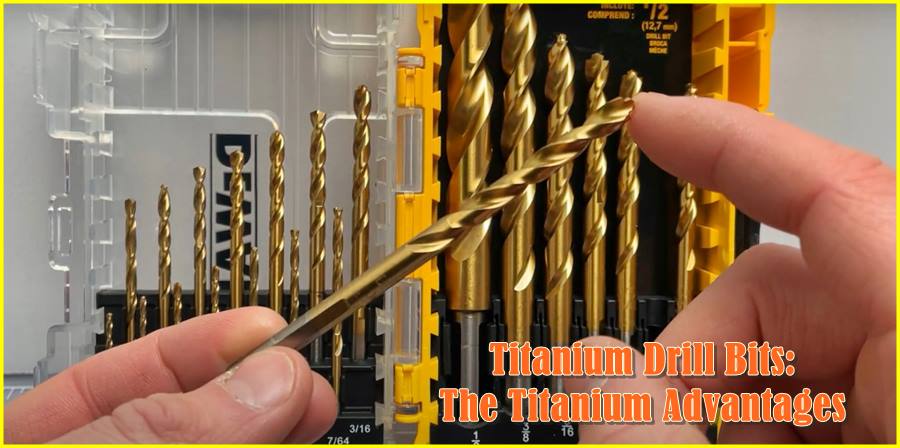Titanium drill bits are a great option for any drilling job. Titanium is an extremely durable material that can withstand high temperatures, making it perfect for jobs like metal cutting and welding. It’s also lightweight, which makes it easy to handle on the job site.
In this article, we’ll talk about titanium drill bits’ uses, types, advantages, and disadvantages so you can make the most informed decision when choosing your next set of drill bits!

Table of Contents
What are titanium drill bits used for?
Titanium drill bits are used in any job where you want to cut through metal, hardened steel, aluminum, magnesium etc. One of their most popular jobs is when drilling through steel, which titanium can do with ease because the material is so durable.
Other uses include nuts and bolts that need to be drilled into place on bicycles, motorcycles, cars or boats; holes for fishing, or holes in pipes for plumbing and electrical work.
Titanium drill bits are also used on jobs that require high temperatures, like welding metal pieces together as well as cutting them with a saw. Titanium is resistant to heat so you can use it over any material without worrying about it melting!
Titanium Bits Shapes and Sizes
Titanium drill bits are available in different shapes and sizes depending on what you need them for. They’re also classified by the number of flutes they have, which can range from two to six. This tells you how wide your holes will be when drilling through metal or other materials.
Can you use titanium drill bits for wood?
Not really, while titanium drill bits are strong enough to cut through metal, they’re not designed for use on wood.
Titanium is a material that needs to be heated up in order to work properly and the only way it can do this is by cutting into metals like steel or aluminum which have higher melting points than wood.
Advantages & disadvantages of titanium drill bits
Titanium has five major advantages over steel and cobalt drill bits. It’s lightweight, durable against high temperatures, resistant to corrosion in water or other liquids, doesn’t splinter when drilling into hard surfaces like concrete, which makes it perfect for jobs where you need a strong bit that can be handled easily on the job site.
There are a few disadvantages to using titanium drill bits. One is that they’re more expensive than steel and cobalt. Most sets of titanium drill bits will cost you about three to four times as much.
Another disadvantage is that they’re more susceptible to bending or breaking if dropped but because of their durability, it doesn’t happen too often in the course of a day’s work!
Want to learn why drill bits break and how to prevent them? Here are some useful tips.
What are the best titanium drill bits?
This answer really depends on the job you need them for. If you’re just drilling into wood or metal, any set of drill bits will work but if you need to cut through steel and other hard materials like concrete, an industrial titanium drill bit with six flutes is your best bet.
The most important thing to remember is that no matter what titanium drill bits you choose, they’re sure to be an upgrade from traditional steel and cobalt.
Cobalt or titanium drill bits?
Cobalt and titanium are two very different materials. Cobalt is more dense than titanium, so it’s able to withstand higher pressures when drilling hard surfaces like concrete without breaking but because of its density, cobalt drill bits also tend to be heavier which makes them less convenient for use in the field.
Titanium on the other hand has a lower density which makes it easier to drill into smaller areas but because of that, titanium bits are also more susceptible to bending.
Which material you use will depend on what kind of job you’re doing as well as your own personal preference. Cobalt is a great option for those who need hardier bits or jobs where weight isn’t an issue but if you’re looking for a material that is lighter and less dense, titanium is the way to go.
Conclusion
Titanium drill bits are an excellent investment for anyone who needs to cut through hard materials like steel or concrete. They’re also lightweight and durable, making them perfect for jobs where you need to use drills in high temperatures or do a lot of drilling at one time (like on construction sites).
